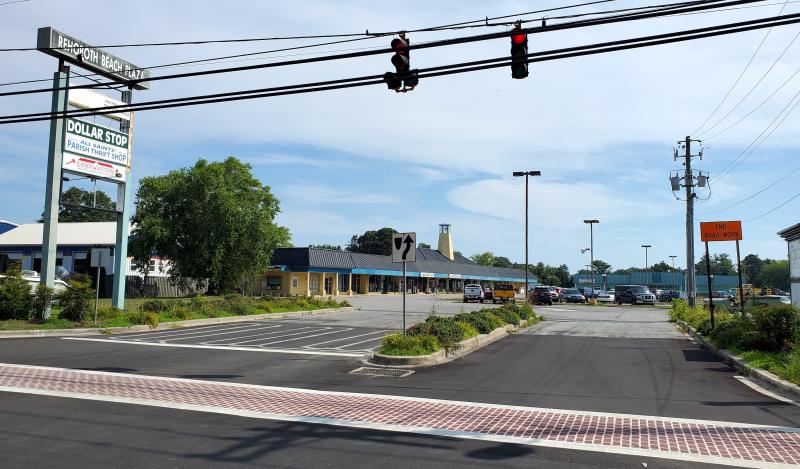Delaware Supreme Court hears BeachWalk case

In a case that has been ongoing in one fashion or another since 2015, Delaware Supreme Court Chief Justice Collins Seitz may have had the most succinct viewpoint.
“This case is a mess,” Seitz said.
The case in question is Ocean Bay Mart vs. City of Rehoboth Beach, a long-running legal battle over whether the owner of the Rehoboth Beach Plaza shopping center can redevelop the seven-plus-acre parcel as a 63-unit development to be known as BeachWalk.
Oral arguments before the Delaware Supreme Court were heard July 20 by a three-justice panel that included Seitz, Justice James Vaughn and Justice Tamika Montgomery-Reeves.
Arguing on behalf of property owner/developer Keith Monigle, attorney Richard Forsten said his client was given representation by Rehoboth officials that the proposed BeachWalk development was code compliant. Monigle wants to turn the former shopping center on the Forgotten Mile into 58 single-family-style units and five multifamily apartment-style units.
What has made the BeachWalk development unusual is that Monigle is seeking to develop the parcel as a condominium, not as a subdivision. A subdivision would come with certain requirements as far as setbacks and street design that a condominium project would not. Forsten said Monigle based plans for the project on the Cottages at Philadelphia Place, an eight-unit condo development on Philadelphia Street.
Monigle held meetings with then-Building Inspector Terri Sullivan on whether the project could be developed as a condominium, and while he did not get a definitive answer, Forsten said it was indicated to him that it could be. Monigle testified at a Court of Chancery trial last year that after meetings between City Solicitor Glenn Mandalas and Monigle’s then-attorney Dennis Schrader, it was indicated to him that a condominium is not a subdivision.
Plans for BeachWalk were submitted in June 2015; two months later, in August, Sullivan left and was replaced by Dam Molina, who ruled in late 2015 that the project could not move forward because of a footnote in the city’s table-of-use regulations stating that no more than one building could be built on a lot.
Schrader and Monigle appealed Molina’s decision to the board of adjustment, which determined in May 2016 that the city’s code was ambiguous and overruled Molina’s decision. The board of adjustment decision was the hinge point of Forsten’s argument before the Delaware Supreme Court. He argued the board’s decision was binding, and the project should have moved forward and been approved by the planning commission as part of the site-plan review process.
However, planners rejected the decision that BeachWalk was a condominium, determining the project was a major subdivision and plans should be submitted as such. Monigle refused and appealed to city commissioners, who upheld the commission’s decision. Shortly after that, city commissioners passed an ordinance codifying that only one building can be built on a lot, and BeachWalk would have to adhere to that.
The first lawsuit came in February 2018 in Delaware Superior Court, where Judge E. Scott Bradley denied the city’s motion to dismiss and remanded the matter back to the city for further review. A second lawsuit was filed in Chancery Court when the city tried to enforce the ordinance. Forsten argued the city could not enforce the ordinance because Monigle had vested rights; in other words, he was grandfathered in.
The city, represented by attorney Max Walton, said the Court of Chancery decision should be upheld, in part because Monigle is arguing the code is ambiguous, but at the same time, his testimony at trial indicates he was unaware of the footnote Molina relied on to say no more than one building could be built on a lot. Walton said it was Monigle’s responsibility to know the code before submitting the project for review. He said Monigle’s real goal in applying as a condominium was in order to have as much density as possible while also avoiding being classified as a subdivision.
In his rebuttal, Forsten said the city’s arguments are misconstruing the facts of the case, and if the Court of Chancery decision is not reversed, it would have negative repercussions for property owners across the state.
No decision was reached by Delaware Supreme Court; the justices typically release an opinion about 60 days after oral arguments.
Ryan Mavity covers Milton and the court system. He is married to Rachel Swick Mavity and has two kids, Alex and Jane. Ryan started with the Cape Gazette all the way back in February 2007, previously covering the City of Rehoboth Beach. A native of Easton, Md. and graduate of Towson University, Ryan enjoys watching the Baltimore Ravens, Washington Capitals and Baltimore Orioles in his spare time.



















































